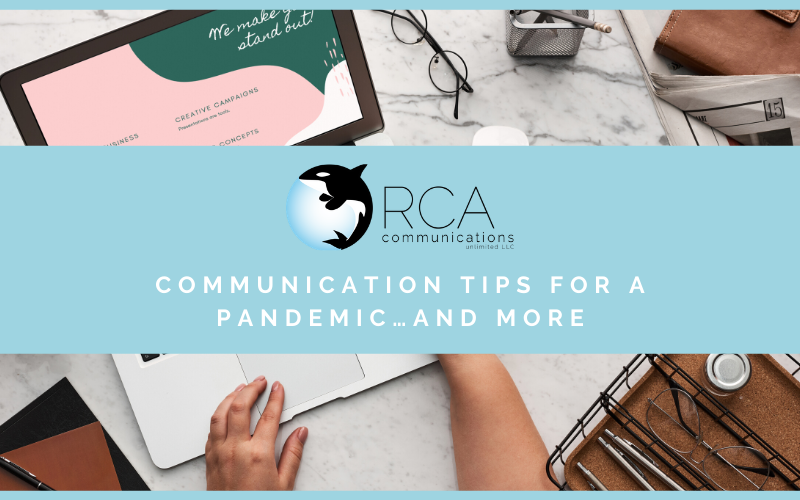Communication Tips for a Pandemic… and More

Our guest blog post this week comes from Cynthia Guiang, the CMO of Orca Communications, America's PR firm for Inventors and Entrepreneurs ©. Read on for her tips on how best to communicate during a pandemic or any other challenging time.

I can be honest and say I have never had to plan a PR campaign around a pandemic and protests before. And I hope I never have to again. However, at our firm when the pandemic hit, we put our muster to the test and what our gut told us was to deploy solid crisis communications practices…and it has worked well. This applies to how we communicated with our clients as well as to the media. Since we aren’t out of the woods yet, here are a few fundamentals that can help you navigate your way through to what we hope is a new normal:
- Communication is key. Sometimes our first instinct is to stop communicating. We fear that we may say something wrong or we’re honestly not quite sure what to say. However, the first rule of a crisis it to make sure you are communicating. Don’t try to ignore the elephant in the room. Or don’t spend too much time trying to get your response just right. Start by acknowledging the issue. It can be as simple as a statement that you understand their concerns and are working on a remedy or promise a full investigation. The sooner you communicate, the less likely panic will set in. Take control of the narrative. When pitching our clients to the media, we stay mindful of what is happening around us, and in some cases, simply address it head on. For example, if there was a tie-in to the pandemic, we found and pitched that angle, but always authentically. We were careful not to come off as if we were trying to capitalize on the situation. There has actually been a natural fit for many products in the COVID-focused world we find ourselves in.
- Whatever you say or do, be honest and transparent. Bold face lies and denials will come back to haunt you. Anything you say after your dishonesty has been exposed will be doubted. Honest statements, even if they show vulnerability, are better. You can acknowledge something happened, that you feel bad about it as well, that you are committed to understanding what happened, that you will maintain transparency as you work through this. And all of this can be done without taking blame or passing blame. Thankfully, neither the pandemic nor the protests triggered any of these types of challenges for our clients, but you probably observed plenty of companies making public statements like these.
- Be prepared to pivot. As you work through a crisis, you’ll inevitably be pondering multiple “what if” scenarios. Choose the path that you feel is both the right thing to do and has the least potential blowback. But stand ready to pivot should the reaction be less than favorable. All of the preparation in the world may still lead you to choose incorrectly. You can run it by your team, your attorneys, trusted partners, and even customers you hold close, and I recommend that you do, but they may all be wrong. Choose an action, because that is always better than inaction, but also be prepared and willing to change direction if needed. And if you do need to change direction, just be honest. Apologize for any missteps and let them know you will take their feedback into account as you formulate a better solution. And pivoting can also apply to how you are positioning your product or even what your product actually is…survivors are nimble and flexible.
- And one of the golden rules of marketing communications applies in these delicate times perhaps more than any other time and that is to be consistent in your messaging. Make sure you have outlined your talking points and that everyone is on the same page. Limiting who the official spokespeople for the company will be is helpful in maintaining this consistency. However, all employees should be informed and also understand who should make statements on behalf of the company and how important it is that they limit who they talk to and what they say about the company – especially during a crisis.
These may sound like rules for engagement when something goes terribly wrong, like your product has a safety recall or you have an employee that goes rogue. In fact, these can be employed for dealing with the smallest crises like an unhappy customer. But they also apply when reaching out to the media when there are serious issues at hand and you find yourself asking, is it really the time to be pitching a cool new juicer?
When the pandemic hit we let our clients know we understand they may have concerns and that we are all concerned. We assured them we were monitoring the situation closely and being sensitive to how we communicate with the media. We shared that every indication is the media is still working on stories (this held true – honestly it has for the most part been business as usual). We found many opportunities with COVID-19 tie-ins and we pivoted certain pitch angles to be more appropriate for the time. We didn’t wait for our clients to ask or to panic wondering what to do – we controlled the narrative. Our consistent and heartfelt message to them has been we are all in this together – so we worked with them to come up with solutions that ensured all of us will come out on the other side stronger than ever. And they stuck with us. And we delivered.
We’re continuing to work harder than ever and ensure that we stay vigilant and mindful of how we are pitching. When the protests started, we deployed these same practices. Let these words be your general guide: Don’t be tone deaf, but also don’t be silent. Communication is key.

Cynthia Guiang is the CMO of Orca Communications, America's PR firm for Inventors and Entrepreneurs ©. She taps into her 30 years of marketing and management experience to lead Orca's dynamic team of PR professionals who deliver exceptional results for their clients every day.
Want more advice and support? Give Orca Communications a follow on Twitter, Instagram, and Facebook!


